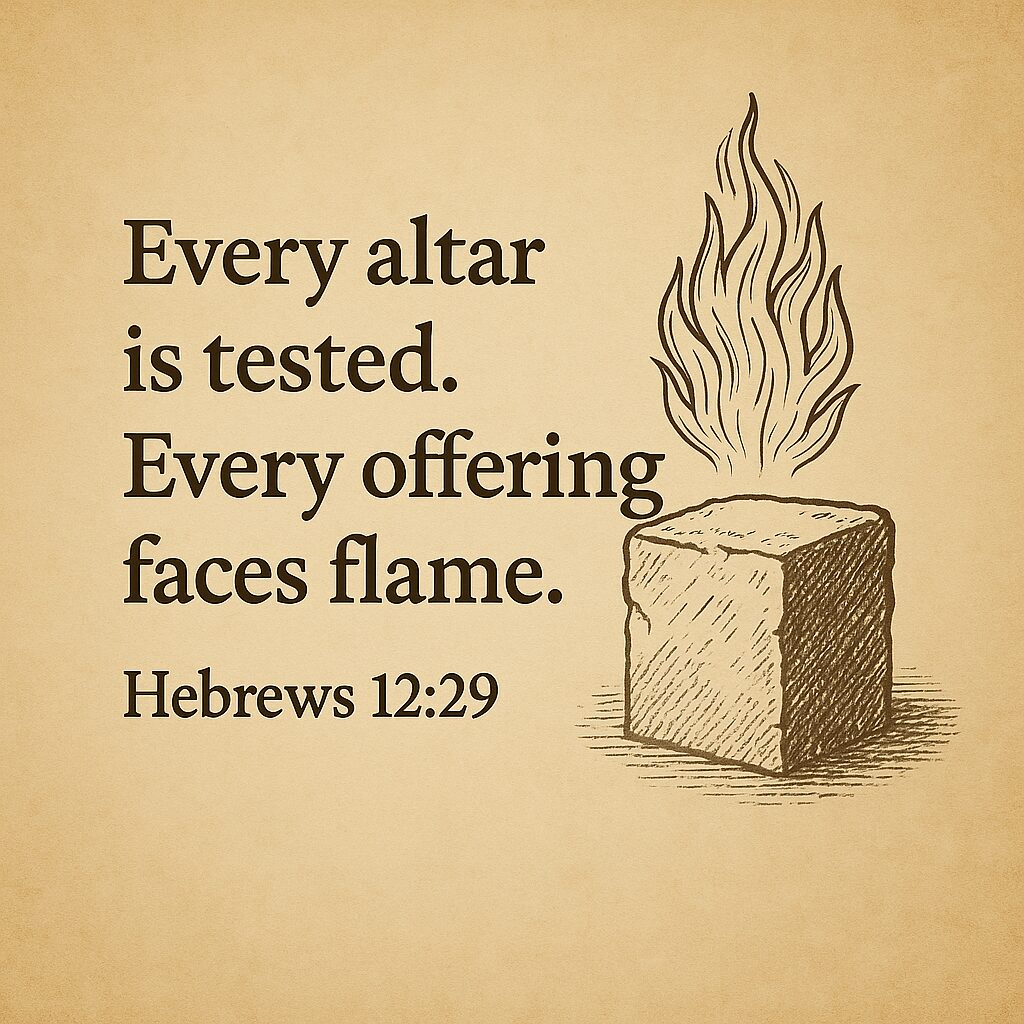
There is a thread of flame running through the Bible. A sword of fire barred the way back into Eden. Fire covered Sinai as the Lord spoke from the mountain. A consuming fire answered Solomon’s prayer when the temple was dedicated. Fire fell on Carmel in front of a wavering nation. And at Pentecost, fire appeared again, resting upon the heads of ordinary men and women.
Every time, fire revealed something. It showed who God is. It showed what He accepts. It showed what He refuses. Fire was never decoration. It was decision.
Cain and Abel
The first altar recorded in Scripture tells the whole story in miniature.
Cain worked the soil and brought fruit. Abel kept sheep and brought the firstlings of the flock. Both gave. But heaven made a distinction. Abel’s offering was received. Cain’s was not.
“By faith Abel offered unto God a more excellent sacrifice than Cain.” — Hebrews 11:4 (KJV)
Faith was the difference. Abel trusted the pattern God had shown. Cain decided another way was good enough. What followed was not worship, but rage. Rejected at the altar, Cain spilled his brother’s blood in the field.
The way of Cain has never disappeared. It is the temptation to offer what pleases us and demand that God bless it. But the fire of God still tests altars. And silence still exposes pride.
Strange Fire
Later came the sons of Aaron. Nadab and Abihu walked into the sanctuary with censers burning in their hands. They were clothed as priests, but the fire they carried was common. It did not come from the altar God Himself had lit.
“There went out fire from the LORD, and devoured them, and they died before the LORD.” — Leviticus 10:2 (KJV)
What consumed them was not a random act of wrath. It was holiness defending holiness. They had blurred the line between common and sacred. They had treated God’s presence as though it could be entered on their terms.
Moses explained it with clarity: “I will be sanctified in them that come nigh me” (Leviticus 10:3 KJV).
That word still stands. Worship is never common. The altar is not a place for experiments. The presence of God is not casual. Strange fire always meets holy fire.
Carmel
When Elijah stood on Mount Carmel, the nation was caught between two opinions. Would they serve Baal, the storm god, or the Lord who had carried them from Egypt?
The prophets of Baal shouted until they were hoarse. They cut themselves until the ground was red. From morning until evening they called. But the heavens stayed silent.
Elijah rebuilt the altar of the Lord. Stone by stone he set it back in order. He laid the sacrifice, drenched it with water, and prayed:
“Then the fire of the LORD fell, and consumed the burnt sacrifice, and the wood, and the stones, and the dust.” — 1 Kings 18:38 (KJV)
In that moment the people dropped to their faces and cried out, “The LORD, he is the God.”
When I picture Carmel, I hear the noise of frenzy on one side, and the quiet weight of covenant faithfulness on the other. Fire does not answer performance. Fire falls where the Word is honored and the altar restored.
The Cross
All of those fires pointed forward to one place.
At Calvary, the consuming fire of God’s judgment fell, not on an altar of stone, but on His Son.
“He was wounded for our transgressions, he was bruised for our iniquities… and the LORD hath laid on him the iniquity of us all.” — Isaiah 53:5–6 (KJV)
“Jesus, when he had cried again with a loud voice, yielded up the ghost. And, behold, the veil of the temple was rent in twain from the top to the bottom.” — Matthew 27:50–51 (KJV)
The torn veil shouted what words could not. The sacrifice was accepted. Wrath was satisfied. The fire had fallen. And when the tomb broke open, heaven testified: the Lamb has prevailed.
Pentecost
Fifty days later, fire appeared again.
“And there appeared unto them cloven tongues like as of fire, and it sat upon each of them.” — Acts 2:3 (KJV)
The fire of God no longer consumed animals. It crowned people. No longer bound to temple courts, the altar had moved into human hearts.
Romans 12:1 calls it plainly: “Present your bodies a living sacrifice, holy, acceptable unto God.”
Pentecost was Sinai revisited, but with grace. The coal that once touched Isaiah’s lips now touched many. The Spirit purified, empowered, and sent. What fire once consumed, it now commissioned.
Now
The patterns remain. Cain still builds his altars. Nadab still lifts strange fire. Baal’s prophets still fill the air with frenzy.
And we, the church, still face the question: what fire burns on our altars?
Modern worship often tempts us with spectacle. Lights, sound, atmosphere. None of these are evil, but they can train us to expect emotion instead of presence, sensation instead of Spirit.
Jesus said the Father seeks worshipers “in spirit and in truth” (John 4:23 KJV). One without the other is counterfeit. Spirit without truth is manipulation. Truth without Spirit is form without flame. Only both together is worship that God seeks.
The fire still tests our offerings.
The End
Scripture ends as it began… with fire.
Daniel saw the throne of God ablaze, a river of fire flowing from before Him (Daniel 7:9–10 KJV). Malachi spoke of a refiner’s fire, purifying the sons of Levi (Malachi 3:3 KJV). Peter declared the heavens and the earth reserved for fire until the day of judgment (2 Peter 3:7 KJV).
Revelation shows Babylon consumed in a single hour: “She shall be utterly burned with fire” (Revelation 18:8 KJV). And then, in the same book, it shows the city of God shining with everlasting light: “The Lord God giveth them light: and they shall reign for ever and ever” (Revelation 22:5 KJV).
The same fire that consumes Babylon will illumine the saints forever.
Closing Reflection
Every altar is tested. Every offering faces flame.
Cain warns us. Nadab warns us. Elijah encourages us. The cross anchors us. Pentecost empowers us. Revelation calls us forward.
Our God is still a consuming fire.
Let His flame fall on your altar now. Not later, not in judgment, but now, in grace. So that in the day when His glory is revealed, your worship will rise pure, and your life will shine with His everlasting light.
